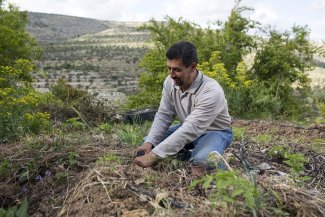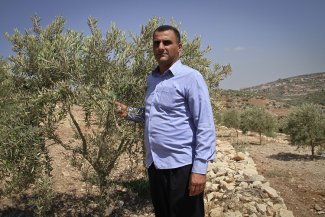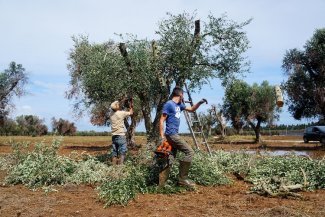Kazem al-Hajj Muhammad holds one of the 80 olive trees and almond saplings uprooted and heavily damaged following an attack by Israeli settlers on 20 October 2022.
Armed with metal bars and stones, a group of men descended on Kazem al-Hajj Muhammmad and his olive grove in the village of al-Mughayyir, north-east of Ramallah, in the early hours of 20 October 2022.
The band of nearly two dozen settlers from the nearby Israeli illegal settlement of Idei Ad attacked the olive farmer and his friend Mazen Mohammed, owner of the grove next door, uprooting and heavily damaging a total of 80 olive trees and almond saplings between the two properties. The trespassers also set fire to a vehicle and water tank for good measure before retreating to their homes in Idei Ad, in the northern West Bank.
“The Israeli army backed the aggressors and threw tear gas canisters and rubber bullets at us so that the settlers could keep on destroying our crops,” recalls al-Hajj Muhammed, a 45-year-old father of four.
It’s not the first time this has happened: he already lost an eye in a similar settler attack a decade ago. And these are far from isolated incidents.
The Israeli human rights NGO Yesh Din documented 42 such attacks in 2021, while this year the United Nations Office for the Coordination of Humanitarian Affairs (UNOCHA) has so far recorded 23 incidents disrupting the harvest season, resulting in more than 800 olive trees destroyed. The International Committee of the Red Cross estimates that between August 2020 and August 2021 alone, settlers destroyed more than 9,300 olive trees.
The harvest season, running from October to November, is a financial lifeline for approximately 80,000 Palestinian families across the West Bank. But it’s about more than money: Palestinians see it as a symbol of their historic bond to the land, a chance to pass down traditions to their children and connect them to their heritage.
“Olive trees and agriculture are my main source of income, yet there’s nothing I can do to protect my crops,” al-Hajj Muhammed tells Equal Times, clasping his arms around an uprooted tree and fighting a sense of resignation. “Settlers have taken a toll on Palestinian farmers’ lives, not only from an economic standpoint.”
At the peak of the season, al-Hajj Muhammed once reaped 30 kilos of olives from each tree. Having lost 35 trees in the attack, he estimates this year’s loss to be a ton of olives, worth some 6,000 shekels (approximately US$1,750 or €1,700).
Formerly carried out in a festive atmosphere, the harvest is now clouded by fear and powerlessness as Israeli aggressions multiply and intensify during this period. The situation has deteriorated so badly that activists accompany farmers to their groves during harvest time in an attempt to dissuade – or failing that, document – further attacks.
A culture of fear, a policy of impunity
In the village of Kisa, south of Bethlehem, attackers from the Ma’ale Amos settlement punctured the lung of a 70-year-old Israeli activist with an iron rod on 19 October, landing her in the hospital. Two days later in Burin, south-west of Nablus, a 22-year-old Palestinian farmer lost an eye to a stone thrown by Yitzhar settlers, in the presence of international volunteers.
The village of Burin, home to roughly 2,500 people on the northern West Bank, is nestled between two hills on which stand two Israeli settlements: Yitzhar and Har Bracha. It is one of the communities most affected by settler-related violence, and 80 per cent of Burin is in Area C, under Israeli military and administrative control.
On 7 November, a few weeks after the attacks on the Israeli activist and Palestinian farmer, 60-year-old farmer Doha Asous got up at 5 a.m. to journey to her olive grove to harvest — only to find 35 of the precious trees planted by her father 70 years ago scattered in pieces after Yitzhar inhabitants took a chainsaw to them. “I couldn’t contain my sorrow. I hugged the broken trunks and waved goodbye to them forever,” Asous recalls. “Then the Israeli army pulled me away from my field.”
Many of the groves of Palestinian farmers are located in the vicinity to settlements in restricted areas under Israeli administrative and military control, meaning farmers need to apply for permits specifying when and for how long they can gain access to their property. On top of that, Israeli law allows the government to seize Palestinian fields if they are abandoned for more than three years, a throwback to Ottoman-era land codes.
Taken together, these rules incentivize attacks to keep the farmers from accessing their groves, thus allowing for claims of abandonment and eventual seizure of the land. “Many families have given up on reaching their lands for fear of getting killed,” says Burin farming activist Ghassan Najjar. “During the harvest settlers attack us on a daily basis — they want to take possession of our lands and build more settlements.”
Today, the number of Israelis living in some 250 settlements built on Palestinian territory — illegally, according to international law — is between 600,000 and 750,000 people. And as settlements keep expanding, the rights of Palestinians to access their land in those areas are stifled by ever more restrictive permitting.
Asous’s grove is in Israeli-controlled Area C, where year-round activities such as pruning, ploughing or fertilizing are forbidden — negatively impacting her olive trees’ production. This year she was allowed just two days to harvest her eight dunams of land, about two acres. “It’s roughly enough to harvest a dozen trees,” she says, a fraction of what she owns.
That’s still luckier than most: the permit approval rate has been declining since 2014, reaching a 73 per cent refusal rate in 2020, according to the Israel-based human rights group HaMoked, which provides free legal aid to Palestinians and brings lawsuits against Israel’s violations of human rights law in the West Bank and the Gaza Strip.
“Settlers feel empowered to attack Palestinians”
Asous filed a complaint over the damage to her grove with the local Israeli and Civil Administration office, the Israeli governing body operating in the West Bank. “It’s not even about money; I’m emotionally attached to my trees. Olive trees are like my kids for me,” she says. “Now I can’t allow myself to sit still — if I think of it, the suffering takes over.”
Her complaint may never be followed up on: according to Yesh Din, since 2005 more than 92 per cent of investigations into complaints made by Palestinian victims were closed without filing legal charges.
“Impunity encourages settlers to take over more land. They feel more empowered than ever to use violent means to attack Palestinians. It’s hard to imagine the situation getting worse than this, but it likely will,” says Chanah Dulin, director of international relations with the NGO Yesh Din, adding that cooperation between settlers and the army on organised attacks has become an established pattern.
Legislative elections in November brought a sharp rise in settler violence, as the far-right Religious Zionist Party and the Otzma Yehudit party surged in the polls.
Itamar Ben-Gvir, the leader of Otzma Yehudit and who advocates expelling “disloyal” Arab citizens from Israel, is slated to become Israel’s next national security minister under a new coalition deal, granting him control over the Israeli Border Police Division in the West Bank.
“The state of Israel is using settlers as its unofficial armed arm in the West Bank to take over more land. Settlers are fully backed by the state. We expect to witness much more violence as far-right parties gain positions of power,” adds Dror Sadot, from the Jerusalem-based NGO B’Tselem, which documents human rights violations in the Occupied Territories and frames Israeli policies in the West Bank as those of an “apartheid regime”.
As the triumph of nationalist religious community has made the Israeli far-right integrated in mainstream politics, human rights groups are becoming increasingly concerned with the implications for Palestinians in the Occupied Territories, going as far as to fear a formal annexation of all or parts of the West Bank through a Knesset vote.
According to UN experts, 2022 is the sixth year of consecutive annual increase in the number of Israeli attacks in the Occupied Territories and the deadliest in the West Bank since 2005. Some 150 Palestinians have been killed this year, including 33 children.
The other existential threat: global warming
Even for those farmers spared attacks on their olive trees, the harvest isn’t what it used to be. Yields have shrunk in recent years due to changing weather patterns and temperature fluctuations during the crucial blossoming period, which hampers the ability of the trees to grow and bear fruit.
In good years, the olive sector is worth between €150 million and €190 million, according to estimates from the Palestinian Trade Center. Considered a symbol of Palestinian identity, the olives are sold as food and used to produce olive oil, soap and cosmetics.
But “over the past decade we have witnessed a remarkable decline in agricultural production in the West Bank — the effects of climate change are desolating,” explains Abed Yasin, an environmental specialist at the Economic and Social Development Center of Palestine, which works closely with farmers in the West Bank.
“In April and May higher-than-usual temperatures dry the olive flower out and, after a few weeks, it falls down.”
2020 in particular saw an astonishingly poor harvest. Only 13,000 cubic metres of olive oil were produced in the West Bank that year — just over half of the 25,000 cubic metres produced in 2014, according to the Palestinian Bureau of Statistics.
This year, “a warmer-than-usual January, followed by overnight frosts in February, altered the flowering process. As a result, I bore heavy losses,” says 65-year-old Robert Abuied, owner of the oldest olive oil press in Bethlehem.
He admits that the amount of olive oil he produces has halved in less than a decade, both due to shrinking fruit and overall less-productive trees. “Olives are getting smaller, just like my income,” Abuied tells Equal Times. “The harvest is not completed yet and I’ve already lost at least 15,000 shekels (€4,220) compared to last year.”
According to Yasin of the Economic and Social Development Center of Palestine, global warming is particularly unforgiving in the West Bank — especially for crops like olives and grapes, which are not suited to hot springs and dry winters. “The number of rainy days has decreased over the last few years, while extreme weather events are more common,” Yasin explains. “An excessive amount of rain falling in one day, followed by days with no rain at all, prevents the trees from absorbing the right amount of rainwater.”
And while farmers around the world can work to adapt their cultivation practices to a warming climate, Palestinians’ lack of regular access to their olive groves, coupled with increasingly violent attacks on the trees and farmers themselves, spell a grim future for their historic way of life.
“Climate change and the occupation are making our job more difficult than it already is,” says olive press owner Abuied, who owns several dunams of land in the inaccessible Seam zone. “Bitter olives: that’s our present, that will be our future.”













